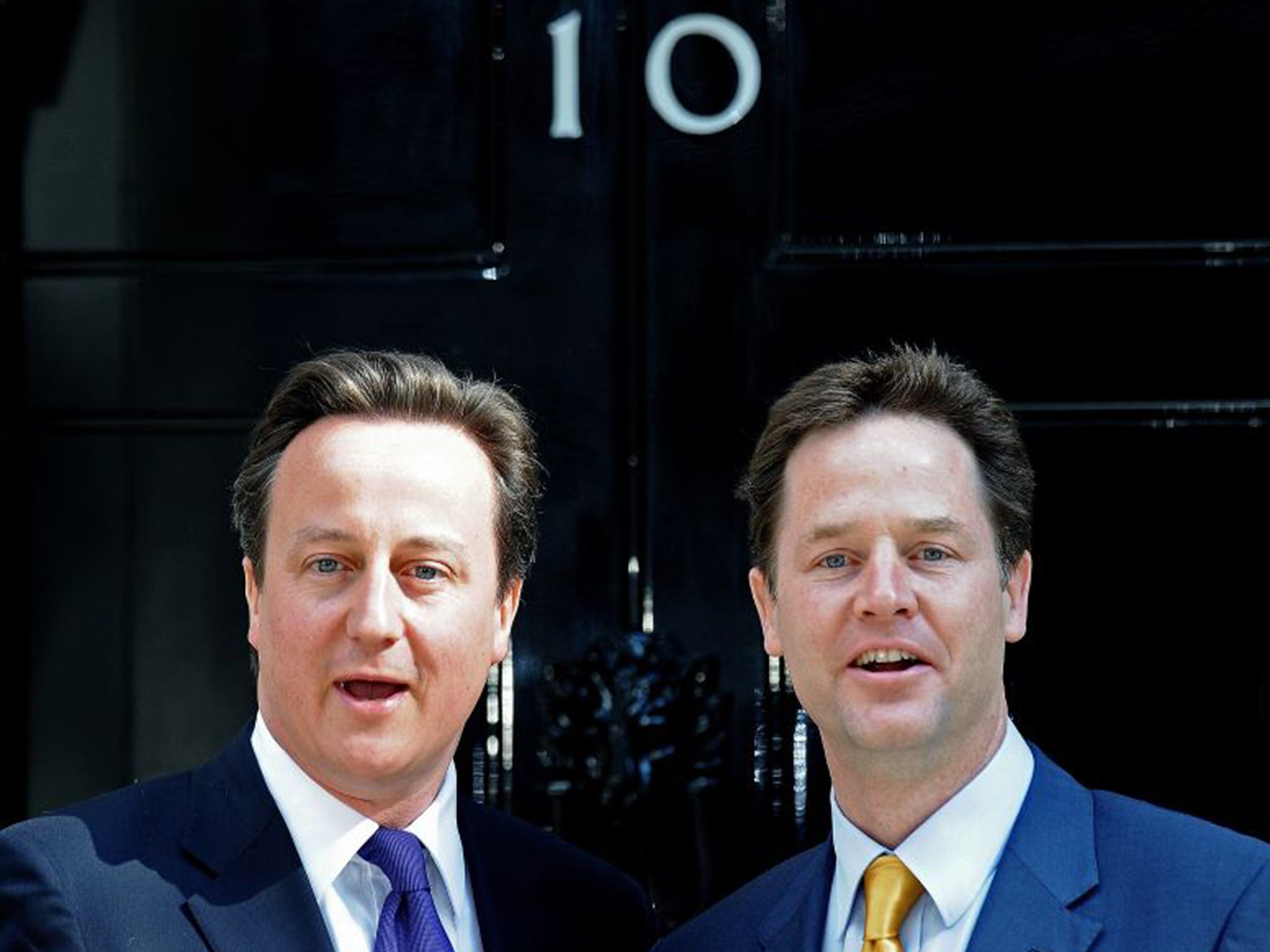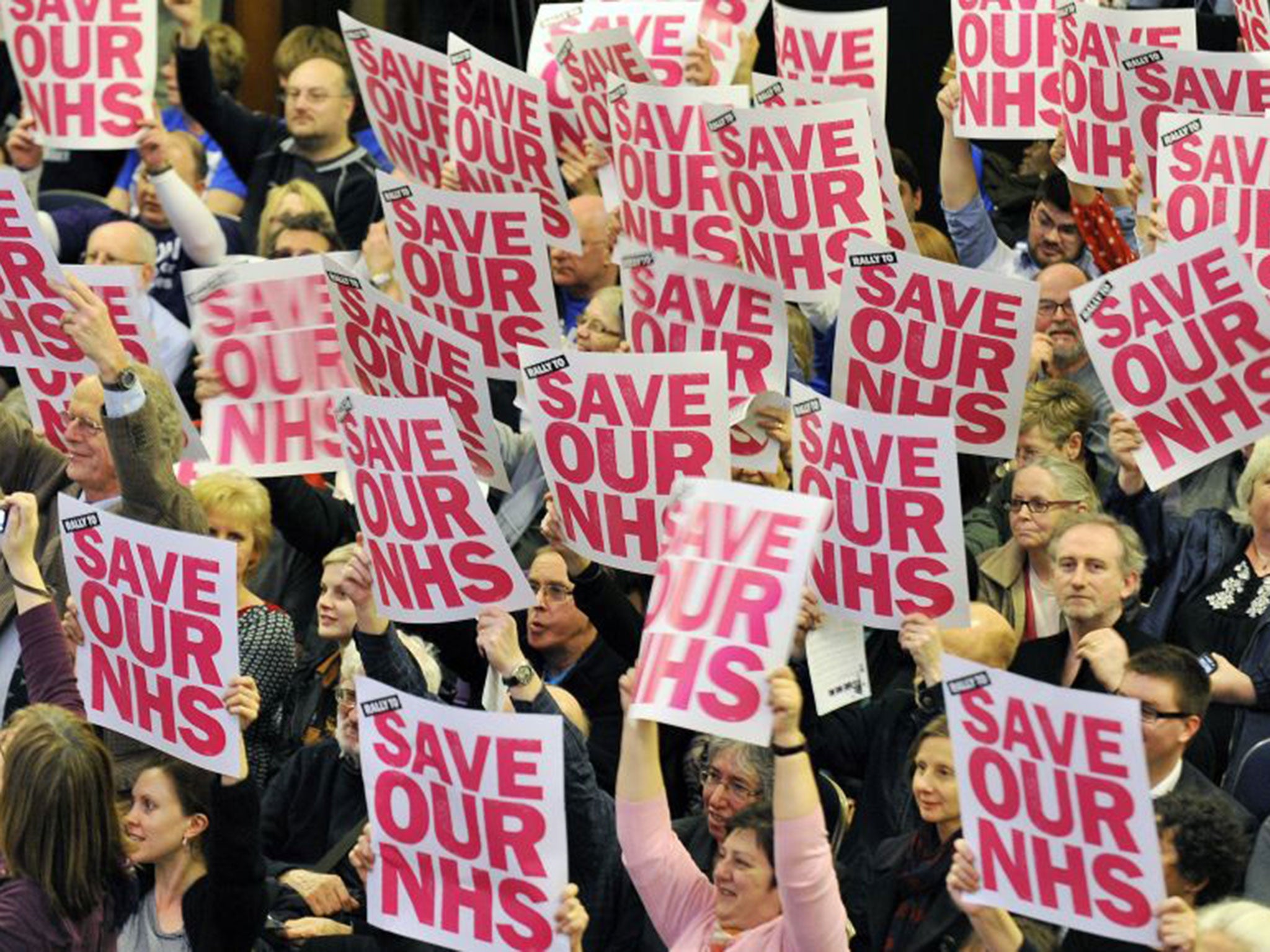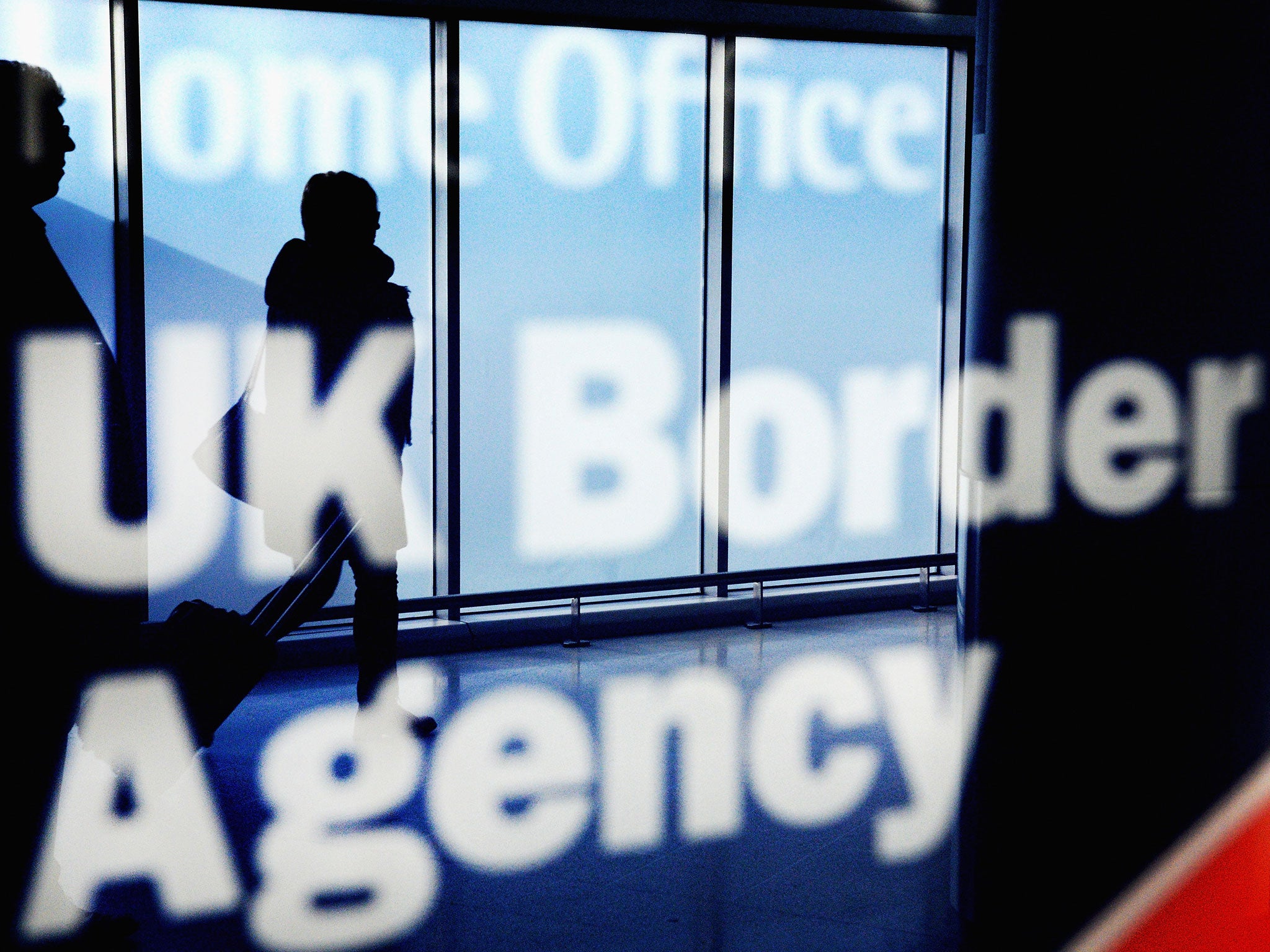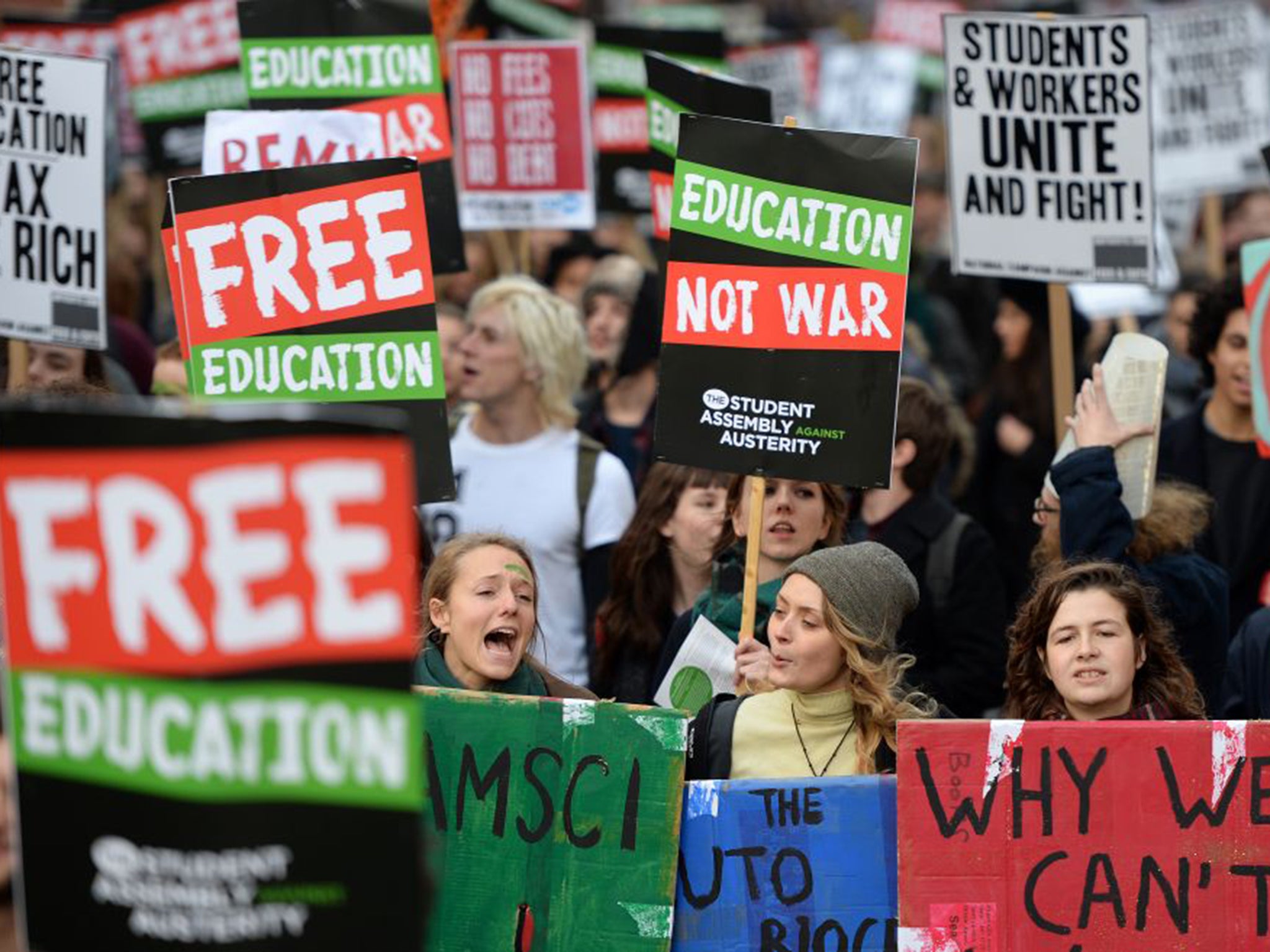Election 2015: How many of the Government's coalition agreement promises have been kept?
Mark Leftly and Mollie Goodfellow give their verdicts

On 20 May 2010, the Prime Minister, David Cameron, and his new Liberal Democrat deputy, Nick Clegg, unveiled the coalition agreement, the document by which they would govern for the next five years.
The pair argued their parties were uniting for the good of the country as it faced down an economic crisis. This 36-page document, they claimed, was “historic” and would result in a “radical, reforming government”. It was a coalition “inspired by the values of freedom, fairness and responsibilities”. Those were bold claims – backed by promises found in the agreement. But did they stick to them? Here, we audit the coalition on 10 policy areas.

Economy
Key promises “Reduce the deficit” the agreement stated. George Osborne’s first Budget promised to eradicate the deficit by 2015, cut quangos and reduce spending.
* Deficit halved as a percentage of national income on Chancellor George Osborne’s watch.
* One in 10 quangos abolished between 2010 and 2013.
* Inflation hits historic 0 per cent low just before the election.
* Unemployment fell from 7.8 per cent to 5.5 per cent.
Promises kept? Half marks: deficit cut by half rather than eliminated, but job creation means the economy is the Tories’ electoral trump card.
Living standards
Key promises Help households reduce energy costs; protect jobs; help the low paid.
* Annual real earnings are up this year – the first time since 2007.
* After initially failing to pass on wholesale price decreases, the Big Six energy companies are cutting bills.
* Increase in the point at which people start to pay income tax, from £6,475 to £10,000 this year.
* First-time buyers in hot spots such as London, Brighton and Cambridge priced out of the housing market, a situation made worse by historically low levels of housebuilding.
Promises kept? Eventually. Only now are low and middle income earners benefiting from the recovery.
Welfare
Key promises Simplify benefits system; reassess those claiming disability benefit; improve incentives to work.
* Iain Duncan Smith’s flagship welfare project, universal credit, combining six benefits and tax credits into a single payment, has been delayed and may never be rolled out.
* Introduction of £500 a week welfare cap.
* New disability benefit assessments poorly implemented, with some waiting more than a year for payment.
* The Government claims the 2013 bedroom tax, intended to tackle social housing under-occupancy, saves £1m a day, but many tenants are in rent arrears for the first time.
Promises kept? Half marks. More employed, but patchy record on introducing reforms.

The law
Key promises Review legal aid; reform rehabilitation and probation; more effective sentencing.
* Prisons close to running out of space, frequently at more than 99 per cent capacity.
* Barristers on strike over legal aid cuts in England and Wales which they argue restrict access to justice.
* The Law Society accuses the government of “seeking to sell justice” as court fees increase to cover Ministry of Justice costs.
* Former prisons minister Crispin Blunt criticises poorly implemented probation reforms which semi-privatise the service.
Promises kept? No. The legal system is in a mess.
Healthcare
Key promises No top-down NHS reorganisation; guaranteed real-terms NHS spending increase in each year of Parliament; strengthen power of GPs.
* Huge restructuring of NHS in 2012 which the King’s Fund says “distracted” doctors from improving patient care.
* NHS funding in England rose by £14.9bn between 2010 and this year, with low inflation meaning this was a 0.8 per cent real-terms annual increase.
* Most NHS funding handed to GP-led Clinical Commissioning Groups.
* A&E waiting times at worst levels for a decade.
Promises kept? Half marks. The NHS has not suffered as badly as some suggest; Andrew Lansley’s reforms were a blunder.

Schools
Key promises Give parents, teachers, charities, and local communities the chance to set up schools; relax rigid national pay structures; attract more top science and maths graduates to teaching.
* Hundreds of free schools have been set up; hundreds more planned.
* 55 per cent of secondary schools have become academies, with greater independence from local councils.
* A-level pass rates down for the first time in more than 30 years last year, as reforms check grade inflation.
* Education secretary Michael Gove moved to chief whip last year because of unpopularity.
Promises kept? Yes – but reforms aren’t any more popular.
Universities and skills
Key promises Support apprenticeships; higher education funding to increase social mobility; help disadvantaged students.
* Apprenticeships doubled to 921,000.
* Tuition fees trebled but student numbers go on rising, including a greater proportion of poorest students.
* Nearly three-quarters of graduates will be paying off student loans until their fifties, claims the Sutton Trust.
* Privately educated pupils remain five times more likely to attend Oxbridge.
Promised kept? Half marks. Lib Dems took a battering in the polls for supporting the trebling of tuition fees, but apprenticeships are working.
Environment
Key promises Cancel Heathrow’s third runway and additional runways at Gatwick and Stansted; create a Green Investment Bank to channel public money into sustainable projects such as windfarms; a “Green Deal” for better home energy efficiency.
* Extra runways at either Gatwick or Heathrow are being considered by a Government-backed commission.
* Onshore wind turbine growth halts after David Cameron decides to “cut the green crap” and axes subsidies.
* Energy secretaries Chris Huhne and Ed Davey overcame Lib Dem dislike of nuclear power to agree construction of Hinkley Point C in Somerset, the first reactor for two decades.
* Emissions of air-borne pollution rose in 2013 despite a promise to meet European Air Quality Standards.
Promises kept? Yes. Cameron and Clegg were probably right that this would be the “greenest government ever” – but it’s a very low bar.

Immigration and borders
Key promises Annual limits on non-EU economic immigrants; speed-up asylum applications process; review terrorist control orders.
* Mr Cameron admitted last week that he had “not met his commitment” to bring annual net immigration down to below 100,000.
* Businesses warn non-EU immigrant cap would stop top talent coming to the UK, and would stifle the economy.
* MPs found there are more than 10,000 asylum seekers who have been here for more than seven years and are still awaiting a Home Office ruling on whether they could stay.
* Control orders replaced by more flexible Terrorism Prevention and Investigation Measures. Critics called them “control orders-lite”.
Promises kept? No. Right-wing Tory MPs are furious that immigration remains a key doorstep issue with voters, and ammunition for rivals Ukip.
International standing
Key promises Maintain US relations; remain strong in Nato and the UN; maintain commitment to spend 0.7 per cent of national income on international aid.
* Aid pledge honoured albeit through a private member’s Bill.
* Tory MPs in revolt over lack of promise to maintain defence spending at 2 per cent of national income.
* UK assists in 2011 overthrow of Gaddafi in Libya which remains unstable. In 2013 Cameron lost vote on joining US-led attacks on Syria.
* Cameron bid to block Jean-Claude Juncker’s nomination for EU Commission presidency fails.
Promises kept? Yes – but Nato and the US fret more than ever over UK’s military capabilities.
Join our commenting forum
Join thought-provoking conversations, follow other Independent readers and see their replies
Comments